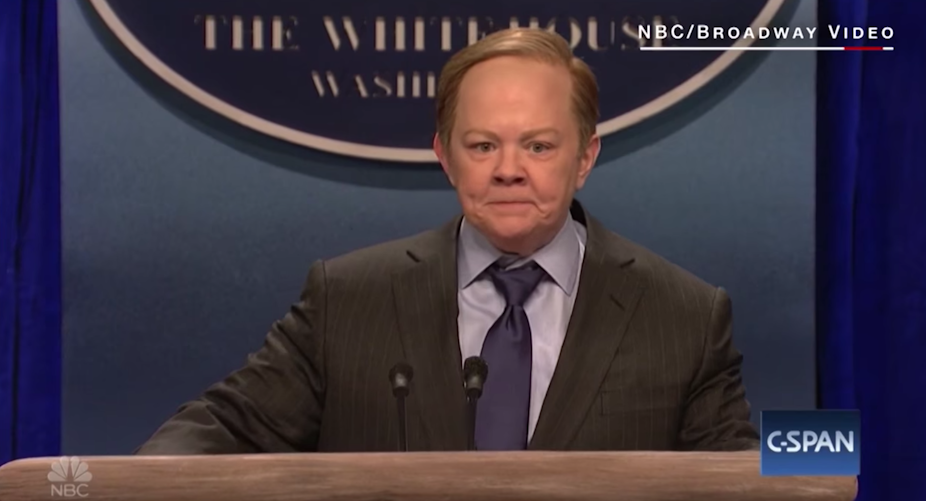According to Politico, the Washington Post, the New Yorker and dozens of other sources, White House Press spokesman Sean Spicer is in trouble with the boss because he has been successfully parodied by Melissa McCarthy on Saturday Night Live.
Were he to lose his job, it would be a rare win for the “satire makes things happen” argument. Mostly, being satirised burnishes your image of strength – that is basically what is happening to Donald Trump – and provides bitter consolation to your opponents.
If Spicer survives another couple of weeks of McCarthy, it will be a badge of honour for him. The wild card, according to some reports, is that being imitated by a woman makes him look “weak” in the eyes of the President. As “nobody has more respect for women” than Donald Trump, I cannot credit that. We will see.
More significant – certainly more common – than the rare possible victory of a satirist over the career of a public figure is the way McCarthy’s caricature is displacing Spicer’s own image in the public imagination. This happens much more often than satire-related career death.
Think back to Margaret Thatcher, and do you really have a photo in your head or the Spitting Image rubber puppet version?
In the Australian context, Prime Ministers Malcolm Fraser and Bob Hawke exist in my memory as, respectively, Ron Tandberg’s minimalist cartoon figure of an Easter Island statue and Max Gillies’ maximalist imitation of a hyper-active narcissist.
My guess is that now, when the millions of people who care to try to imagine Sean Spicer, they mostly have the McCarthy version in their heads.
What does this mean? That a great political caricature has great imaginative power, but is seldom lethal. Indeed, recognition in political caricature is a badge of honour that only a few public figures achieve, as witness the convention among cartoonists of labelling the suits or briefcases of marginal figures with names.
Some politicians are recognisable by props, and my advice to ambitious politicians would be to try to choose a prop they can live with. Alexander Downer certainly regrets the fishnet stocking episode that followed him for the rest of his career. I wonder how Tony Abbott feels about the red speedos.
Only those blessed with odd faces and substantial power are instantly recognisable from their faces alone. Trump has his hair done differently these days, but the strange comb-over he campaigned with will remain in the public memory long after he leaves office, even as his rather nondescript face fades.
For a public figure, a strong caricature presents as a risk because it is an act of aggression – a humorous expression of anger, disgust, or contempt. Certainly, dictators don’t have to put up with this sort of insolence. However, caricature in a democratic system is also an opportunity if the wound does not kill.
Surviving the slings and arrows of outrageous satire tends to strengthen public images in liberal democracies, as can be seen in a range of long-term leaders like Thatcher, Reagan, Blair, Hawke, and Howard.
The people who oppose them love to hate the caricatured and get a sort of cathartic release from it. The people who support them register the hostility of their opponents in the satirising classes, and figure their guy must be doing something right to get up their noses. Very few political careers die of shame.
It’s too early to tell, but this is probably what is happening in the Trump presidency. Were I Sean Spicer (which I’m not – that is Melissa McCarthy’s job) I’d advise him to have a thicker skin about Saturday Night Live. Whether Spicer is secure enough to survive on the same advice is still in play.

